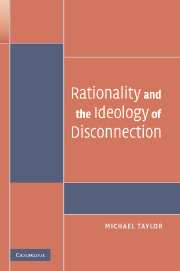Book contents
- Frontmatter
- Contents
- Preface
- Part one Attachments, reasons, and desires
- Part two Strokes of havoc: the market ideal and the disintegration of lives, places, and ecosystems
- 3 The market utopia
- 4 Dis-integration
- Postscript to part two: “Can selfishness save the environment?”
- Part three Living in unity, doing your part: rationality, recognition, and reciprocity
- Index
- Title in the series
Postscript to part two: “Can selfishness save the environment?”
Published online by Cambridge University Press: 12 January 2010
- Frontmatter
- Contents
- Preface
- Part one Attachments, reasons, and desires
- Part two Strokes of havoc: the market ideal and the disintegration of lives, places, and ecosystems
- 3 The market utopia
- 4 Dis-integration
- Postscript to part two: “Can selfishness save the environment?”
- Part three Living in unity, doing your part: rationality, recognition, and reciprocity
- Index
- Title in the series
Summary
I borrow the title of this postscript from the title of an article in The Atlantic Monthly. The gist of this (glib and sloppy) piece is that, yes, selfishness can save the environment, indeed it is our only hope, because moral suasion, “normative pressures,” or “appealing to people's better natures” simply do not work, at least in this area of getting people to stop trashing the natural environment. But this view is not confined to journalists; it is standard among economists. For example, Geoffrey Heal, an economist of repute who has published widely over several decades on the economics of natural resources and the environment, says that there are three broad ways of “persuading people to conserve the natural environment”: government regulation, using sanctions; appeals to “principle” or relying on people doing what they ought to do; and arranging things so that choosing conservation is in people's “economic self-interest.” Most of us, he goes on to say, would find the first route unacceptable, so it wouldn't work. As for the second approach – “appeals to the best in human nature” – he says “historically this has not worked, and there are no reasons to expect a change in the near future.” This leaves the use of economic incentives, which “stands out” and has generally worked and “must be our first line of defense.
- Type
- Chapter
- Information
- Rationality and the Ideology of Disconnection , pp. 112 - 124Publisher: Cambridge University PressPrint publication year: 2006



